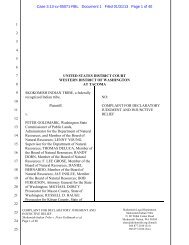Appellant Brief - Turtle Talk
Appellant Brief - Turtle Talk
Appellant Brief - Turtle Talk
Create successful ePaper yourself
Turn your PDF publications into a flip-book with our unique Google optimized e-Paper software.
In Strate, the Supreme Court applied the Montana Rule to an accident<br />
occurring on a state’s right-of-way over tribal trust land. 520 U.S. 438. The Court<br />
explained that even though the case involved tribal trust land, the Montana rule<br />
would apply because the Tribe had relinquished its control over the right-of-way.<br />
Id. at 455-56. For this reason, the Court concluded, the right-of-way was the<br />
equivalent of non-Indian fee land for jurisdictional purposes. Id. The District<br />
Court’s interpretation of that holding–that all rights-of-way are the equivalent of<br />
non-Indian land–was incorrect. Correspondingly, its grant of summary judgement<br />
was inappropriate.<br />
A. Standard of Review<br />
This Court reviews a district court’s grant of summary judgment de novo.<br />
See Bass v. SBC Communications, Inc., 418 F.3d 870, 872 (8th Cir. 2005).<br />
Summary judgment is appropriate only “if the pleadings, depositions, answers to<br />
interrogatories, and admissions on file, together with the affidavits . . . show that<br />
there is no genuine issue as to any material fact and that the moving party is<br />
entitled to judgment as a matter of law.” Fed. R. Civ. P. 56(c). “As a general rule,<br />
summary judgment is proper only after the nonmovant has had adequate time for<br />
discovery.” Iverson v. Johnson Gas Appliance Co., 172 F3d. 524, 530 (8th Cir.<br />
1999) (internal quotation marks and citations omitted). More generally, this Court<br />
reviews questions of law de novo. Watkins v. Nat’l Transp. Safety Bd., 178 F.3d<br />
12

















